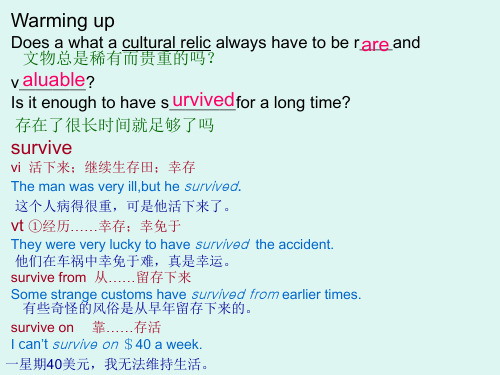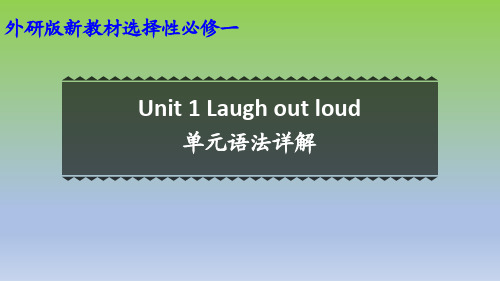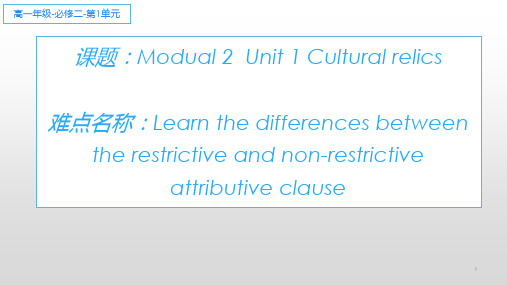高中一年级英语必修二Unit1语法课件
合集下载
人教版高一英语必修二Unit 1课文课件(共76张PPT)

如:
The job was very difficult, which took the workers ten months to do. 这项工作十分困难,它花费了工人们十 个月的时间。
It took me quite a long time to understand the meaning of the painting. 我花了相当长的时间才理解了那幅画的 意义。
The wedding car is decorated with flowers and ballons.
婚车用花和气球装饰着。
decorate sth in /after…style按照……风格装饰
The house is decorated in western style . 房子采用西式装饰。
的 经 验 介 绍 ,特别是 昨天看 了我们 威海市
C. in search of D. looked for
(2). Many farmers go into towns and cities in
search_o_f__ good jobs and higher pay.
(3). Many people joined them in the search _f_o_r_ gold.
被选择的琥珀色彩艳丽呈黄褐色,像蜜一样。
a beautiful yellow-brown color like h_o_n_e_y__蜂蜜 . The ⑹d_e_s_ig_n 设计 of the room was in the ⑺ f_a_n_c_y_ 设想;爱好 ⑻s_t_y_le 风格 popular in those days .
这件礼物就是琥珀屋,它之所以有这个名字,是因为造这间房子用了近几 吨琥珀,
高中英语必修第一册及必修第二册Unit 1 Unit 2 词形变化汇总复习课件

词形变化
Unit 3
1. _d_i_v_e_rs_e__adj. 不同的;多种多样的→d__iv_e_r_s_it_y_ n. 差异(性);不同(点);多样性 2. __fo_r_t_u_n_e__ n. 机会;运气→_fo_r_t_u_n_a_t_e_ adj. 幸运的;吉利的→_f_o_rt_u_n_a_t_e_ly_ adv. 幸运地;幸 亏 3. __a_d_m_i_t___ vi.&vt. 承认 vt. 准许进入(或加入) →__a_d_m_i_s_si_o_n n. 允许进入;入场费;承认 4. _d_e_f_in_i_t_e_adj. 确实的,肯定的→_d__ef_i_n_it_e_ly_ adv. 肯定;确实 5. __h_is_t_o_r_y__ n. 历史 →__h_i_st_o_r_ic__ adj. 历史上著名(或重要)的;有史时期的→__h_is_t_o_r_ic_a_l adj. (有关)历史的 6. _i_m__m_i_g_r_a_te_ vi. 移入(外国定居)→__i_m_m__ig_r_a_n_t_ n. (外来)移民;外侨 adj. 移民的,移居的
frightened
frightening
frighten v. __________ adj.害怕的;受惊的;受恐吓的 ____________ adj.令人害怕的
词形变化
Unit 1
1. creative adj. 创造性的; 有创造力的→___c_r_ea_t_e____ vt. 创造, 创作→__c_r_e_a_ti_o_n___ n. 创造 →__c_r_e_a_ti_v_e_ly__adv. 创造性地 2. promote vt. 促进; 提升; 推销; 晋级→_p_r_o_m__o_ti_o_n__ n. 提升; 晋升; 推销 3. application n. 申请; 运用→____a_p_p_ly____ v. 申请; 应用 4. balance n. 平衡vt. 使平衡→___b_a_la_n_c_e_d__ adj. 平衡的 5. proposal n. 提议; 建议→__p__ro_p__o_se___ v. 建议 6. likely adj. 可能的adv. 可能地→__u_n_li_k_e_ly____ adj. 不可能的 adv. 未必 7. prevent vt. 阻止; 阻碍→__p_r_e_v_en__ti_o_n_ n. 预防; 阻止 8. loss n. 丧失; 损失→_____lo_s_e____vt. 遗失→____lo_s_t_____ adj. 迷路的 9. contribution n. 贡献; 捐款; 捐赠→_c_o_n_t_r_ib_u_t_e__vi. &vt. 捐献; 捐助 10. investigate vt. 调查; 研究→_i_n_v_e_st_i_g_a_ti_o_nn. 调查
2019外研版高中英语选择性必修二Unit1 单元语法详解课件

e. We are specially trained clowns who work as part of a program
known as “hospital clowning”. (教材 P3).
f. We have to be very sensitive and work closely with the doctors and
● 温馨提示:主句是疑问句时,首先要确定定语从先行词, 方法是将疑问句恢复成肯定句,然后进行辨别确认, 请观察 以下句子
a. Is this the factory __(_t_h_a_t_/w__h_ic_h_)__ we visited last week?
※肯定句:This is the factory(_th_a_t_/_w__h_ic_h)we visited last week.
rushed her to the hospital after she fell off her bicycle. (教材 P51)
d. Scientific studies show that laughter produces chemicals to make
people fee better, which means clown doctors can be helpful. (教材 P2)
b. Is this factory _t_h_e__o_n_e__(t_h_a_t_) we visited last week?
※肯定句:This factory is _th__e_o_n_e__(t_h_a_t) we visited last week?
c. Is this the factory ____w_h__e_re____ his father works?
known as “hospital clowning”. (教材 P3).
f. We have to be very sensitive and work closely with the doctors and
● 温馨提示:主句是疑问句时,首先要确定定语从先行词, 方法是将疑问句恢复成肯定句,然后进行辨别确认, 请观察 以下句子
a. Is this the factory __(_t_h_a_t_/w__h_ic_h_)__ we visited last week?
※肯定句:This is the factory(_th_a_t_/_w__h_ic_h)we visited last week.
rushed her to the hospital after she fell off her bicycle. (教材 P51)
d. Scientific studies show that laughter produces chemicals to make
people fee better, which means clown doctors can be helpful. (教材 P2)
b. Is this factory _t_h_e__o_n_e__(t_h_a_t_) we visited last week?
※肯定句:This factory is _th__e_o_n_e__(t_h_a_t) we visited last week?
c. Is this the factory ____w_h__e_re____ his father works?
2019人教版高中英语必修二Unit 1 公开课课件

3.关系代词在从句中作主语 e.g. The book __th_a_t_/_w_h_i_c_h is cheap is on the desk.
4.关系代词在从句中作宾语 e.g. The book __th_a_t_/_w_h_i_c_h_/X___ I bought yesterday is on the desk.
2.where引导定语从句
where表示地点, 代替先行词并在定语从句中做_地__点__状__语_,其先行词往往是
具__体_地__点__名词place, room, mountain, airport或抽__象__地__点__名__词__如case, state,
condition, point, situation等。
9. 关系代词宜用that不用which的情况
1. 当先行词是all,much,anything,something,everything,nothing,little, few等不定代词时:
There was not much (that) we could do when it was raining. 下雨的时候我们能做的事不多。
That is all that works. 这就是所有的工作。
2. 当先行词为序数词/形容词最高级,或被序数词/形容词最高级修饰时:
The old woman, who lives on her own, has a cat for company. 这位独自居住的老妇人,养了一只猫陪伴她。
1. 我去年买了这栋房子,它有一个漂亮的花园。 The house, __w__h_ic_h__I _b_o_u_g_h_t _la_s_t _y_e_a_r _____ has a lovely garden. 2. 第一次遇见怀特先生的时候,是在我生命中一个非常艰难 的时期。 The time___w_h_e_n_I_f_ir_s_t _m_e_t_M__r._W__h_it_e____was a very difficult period of my life.
4.关系代词在从句中作宾语 e.g. The book __th_a_t_/_w_h_i_c_h_/X___ I bought yesterday is on the desk.
2.where引导定语从句
where表示地点, 代替先行词并在定语从句中做_地__点__状__语_,其先行词往往是
具__体_地__点__名词place, room, mountain, airport或抽__象__地__点__名__词__如case, state,
condition, point, situation等。
9. 关系代词宜用that不用which的情况
1. 当先行词是all,much,anything,something,everything,nothing,little, few等不定代词时:
There was not much (that) we could do when it was raining. 下雨的时候我们能做的事不多。
That is all that works. 这就是所有的工作。
2. 当先行词为序数词/形容词最高级,或被序数词/形容词最高级修饰时:
The old woman, who lives on her own, has a cat for company. 这位独自居住的老妇人,养了一只猫陪伴她。
1. 我去年买了这栋房子,它有一个漂亮的花园。 The house, __w__h_ic_h__I _b_o_u_g_h_t _la_s_t _y_e_a_r _____ has a lovely garden. 2. 第一次遇见怀特先生的时候,是在我生命中一个非常艰难 的时期。 The time___w_h_e_n_I_f_ir_s_t _m_e_t_M__r._W__h_it_e____was a very difficult period of my life.
高中一年级英语必修二Unit1语法课件

B.
I will never forget the days when we spent our holidays together.
I will never forget the days that / which we spent together.
C.
This is the reason why he was dismissed.
定语从句归纳总结 一、定语从句的定义:
用来修饰名词或代词的从句叫定语从 句。被定语从句所修饰的名词或代词叫先行 词(antecedent)。定语从句一般是由关系 代词或关系副词来引导的。相当于名词和形 容词的作用。
eg: 1. Do you know the man who came to see Xiao Yang this morning?
1. The man who / that lives next door is a writer. 2.The woman who / whom / that/- I visited last week is a famous writer. 3. Beijing is the city which / that has got the chance to host the 2008
• 在这时as可以在句首, which 不可以; as 有正如的意思, 而which 没有。
八、限制性定语从句和非限制性定语从句
1.限制性定语从句是先行词在意义上不可缺少的 定语,如果去掉,主句的意思就不完整或失去意义。 这种从句和主句的关系十分密切,写时不用逗号分 开。限制性定语从句中作宾语的关系代词常可省略。
(3) 在非限定性定语从句中必须用which不能 用that。
They have invited me to visit their country, which is very kind of them.
必修2第1单元语法 高中英语必修课件

Realizing his parents' love, Nezha doesn't give in to his fate (命运) which/that may destroy him. Instead, he makes a change of himself and gains a new life.
高一年级-必修二-第1单元
课题:Modual 2 Unit 1 Cultural relics
难点名称:Learn the differences between
the restrictive and non-restrictive attributive clause
1
目录
CONTENTS
导入
知识讲解
课堂练习 难点巩固
1. How should we deal with judgments(判断)on those who are treated unfairly?
We shouldn't make judgments which are just based on others' ideas. Instead, we should try to see the truth that is behind the appearance to avoid(以免) treating someone wrongly.
知识讲解 Learn the differences between the restrictive and non-restrictive attributive clause
难点突破
A: Nezha always makes trouble that/which causes the villagers' misunderstanding.
高一年级-必修二-第1单元
课题:Modual 2 Unit 1 Cultural relics
难点名称:Learn the differences between
the restrictive and non-restrictive attributive clause
1
目录
CONTENTS
导入
知识讲解
课堂练习 难点巩固
1. How should we deal with judgments(判断)on those who are treated unfairly?
We shouldn't make judgments which are just based on others' ideas. Instead, we should try to see the truth that is behind the appearance to avoid(以免) treating someone wrongly.
知识讲解 Learn the differences between the restrictive and non-restrictive attributive clause
难点突破
A: Nezha always makes trouble that/which causes the villagers' misunderstanding.
人教版高中英语必修2unit1课文知识点详解ppt课件
She fancied herself (as/to be)a serious actress.
精选ppt课件
14
3.design
It was designed for the palace of Frederick
Ⅰ. 观察思考
(回归课本P1)
The basic design of the car is very similar
中。
考点提炼 该句使用了have sth.done结构,其 中过去分词在句中作宾语补足语,表示被动的含
义。
get sth.done可替换have sth.done表达相同的意
思。该结构字面的意思是“使某事被做 ”,有时
可翻译成“请人做某事 ”,有时也可能是自己做
某事,有时have还有“精选遭ppt遇课件,遭受”之意。
6
3.This was a time when the two countries were
at war.当时正处于两国交战的时期。
考点提炼 This is/was a time when...意为
“ 这是一个……的时期/时候 ”。其中when引 导的是定语从句,修饰先行词a time。
4.There is no doubt that the boxes were then
3.We use flowers and balloons to decorate our
classroom on New Year’s Day.
精选ppt课件
1
4.Illegally parked cars will be removed by traffic police.
5.The broken ship sank to the bottom of the sea.
精选ppt课件
14
3.design
It was designed for the palace of Frederick
Ⅰ. 观察思考
(回归课本P1)
The basic design of the car is very similar
中。
考点提炼 该句使用了have sth.done结构,其 中过去分词在句中作宾语补足语,表示被动的含
义。
get sth.done可替换have sth.done表达相同的意
思。该结构字面的意思是“使某事被做 ”,有时
可翻译成“请人做某事 ”,有时也可能是自己做
某事,有时have还有“精选遭ppt遇课件,遭受”之意。
6
3.This was a time when the two countries were
at war.当时正处于两国交战的时期。
考点提炼 This is/was a time when...意为
“ 这是一个……的时期/时候 ”。其中when引 导的是定语从句,修饰先行词a time。
4.There is no doubt that the boxes were then
3.We use flowers and balloons to decorate our
classroom on New Year’s Day.
精选ppt课件
1
4.Illegally parked cars will be removed by traffic police.
5.The broken ship sank to the bottom of the sea.
高一英语必修2---unit1课文全解ppt课件
have completely ________his confidence.
A.injured
B.destroyed
ห้องสมุดไป่ตู้
C.shocked
D.attacked
解析:考查动词辨析。句意:他又叹了一口气,这次物理考试不及格似乎完 全摧毁了他的自信心。destroy“摧毁,毁坏”,符合句意;injure受伤; shock使震惊;attack进攻。
Zhou Kai went and did as he was told.周凯走了并按照告诉他的做了。
[知识提炼] as conj.作“按照;如同”讲,引导方式状语从句。有时后面接 介词短语。
[句式仿写] 他们就按被告诉的执行那个命令。
1.(2010年高考天津卷)People have always been ________ about exactly
how life on earth began.
A.curious
B.excited
C.anxious
D.careful
解析:句意:人们对于地球上人类的起源问题一直充满好奇。be curious about对……感到好奇,符合题意。be excited about 因……而激动;be anxious about为……而忧虑;be careful about当心……。
pick up 拾起,拿起;卷起;掀起;搭载;(无意中)学会;接收(无线电 信号);收拾,整理;加(速度);取(物),开车接(人);(健康、生意、社交生 活等)恢复,变好,好转
①The economy in the USA is finally beginning to pick up again. 美国的经济终于又开始有所好转。 ②He picked up English when traveling in America. 他在美国旅行时学到了一些英语。 ③The bus gradually picked up speed and disappeared. 汽车逐渐加速后消失了。 ④ Pick up all the words in the poem that suggest despair. 挑出这首诗中所有表示绝望的词。
人教版高中英语必修二Unit1课件
• 6.worth prep.值得的→__________adj.值得……的→__________adj.值得做的 • [答案] worthy;worthwhile
第五页,共106页。
• 7._______________拆开→________________from除了,除了……还
• [答案] take apart;apart
• [答案] survivor;survival
• 4.amaze vt.使吃惊;使惊讶→__________ adj.令人吃惊的→__________ adj.(感到)
惊讶的,吃惊的
• [答案] amazing;amazed
• 5.reception n.接待;接收;招待会→__________ v.接受;招待;收听 • [答案] receive
第一页,共106页。
• Ⅰ.识记填读
• 1.__________adj.文化的
• [答案] cultural • 2.__________vt. & n.争论,辩论 • [答案] debate
• 3.__________n.神秘;神秘的事物
• [答案] mystery
第二页,共106页。
• 4.__________n.目击者,证人
• 8.______________________看重;器重→think little of对……评价不高
• [答案] think highly of
第六页,共106页。
• Ⅲ.构词填读
• 1.rare adj. 稀罕的;珍贵的;稀有的→__________ adv.很少,不常
• [答案] rarely
• 1.in__________寻找→search__________寻找
第五页,共106页。
• 7._______________拆开→________________from除了,除了……还
• [答案] take apart;apart
• [答案] survivor;survival
• 4.amaze vt.使吃惊;使惊讶→__________ adj.令人吃惊的→__________ adj.(感到)
惊讶的,吃惊的
• [答案] amazing;amazed
• 5.reception n.接待;接收;招待会→__________ v.接受;招待;收听 • [答案] receive
第一页,共106页。
• Ⅰ.识记填读
• 1.__________adj.文化的
• [答案] cultural • 2.__________vt. & n.争论,辩论 • [答案] debate
• 3.__________n.神秘;神秘的事物
• [答案] mystery
第二页,共106页。
• 4.__________n.目击者,证人
• 8.______________________看重;器重→think little of对……评价不高
• [答案] think highly of
第六页,共106页。
• Ⅲ.构词填读
• 1.rare adj. 稀罕的;珍贵的;稀有的→__________ adv.很少,不常
• [答案] rarely
• 1.in__________寻找→search__________寻找
人教版高中英语必修二第一单元语法课件-非限制性定语从句
Book 2 Unit 1 Grammar The Restrictive and Non-restrictive Attributive Clauses
By Wendy Enping No. 1 Middle School
Teaching aims: 1. Revise what we have learned in Book 1 Unit 4 and Unit 5; 2. Master the Restrictive Attributive Clauses and the Non-restrictive Attributive Clauses and tell the differences between them; 3. Application of the Non-Restrictive Attributive Clauses.
限制性定语从句 形式上 意义上 作用上 翻译时 关系词 非限制性定语从句
不用逗号
去掉后句意不完整
用逗号 去掉后,句意完整 补充说明
可修饰先行词或主句
修饰限制
只可修饰先行词
译为“……的”
可译为并列句
作宾语时可以省略
不可省略且不能用 that , why 引导
Let’s have a try(5’) 1. China, _____ was founded in 1949, is becoming more and more powerful. 2. He was late again, _____ made his teacher unhappy. 3. His mother, _____ loves him very much, is strict with him. 4. Sun Yida, _____ everyone likes very much, is one of the best athletes in our class. 5. Angles, _____ native language is German, can read and write in several foreign languages. 6. The play, _____ style is informal, is popular with the young people. 7. They went to London, _____ they lived for six months. 8. He will put off the picnic until May 1st, _____ he will be free. 9. Last summer I visited the People’s Great Hall, _____ many important meetings are held every year. 10. I had told them the reason, for _____ I didn’t attend the meeting.
By Wendy Enping No. 1 Middle School
Teaching aims: 1. Revise what we have learned in Book 1 Unit 4 and Unit 5; 2. Master the Restrictive Attributive Clauses and the Non-restrictive Attributive Clauses and tell the differences between them; 3. Application of the Non-Restrictive Attributive Clauses.
限制性定语从句 形式上 意义上 作用上 翻译时 关系词 非限制性定语从句
不用逗号
去掉后句意不完整
用逗号 去掉后,句意完整 补充说明
可修饰先行词或主句
修饰限制
只可修饰先行词
译为“……的”
可译为并列句
作宾语时可以省略
不可省略且不能用 that , why 引导
Let’s have a try(5’) 1. China, _____ was founded in 1949, is becoming more and more powerful. 2. He was late again, _____ made his teacher unhappy. 3. His mother, _____ loves him very much, is strict with him. 4. Sun Yida, _____ everyone likes very much, is one of the best athletes in our class. 5. Angles, _____ native language is German, can read and write in several foreign languages. 6. The play, _____ style is informal, is popular with the young people. 7. They went to London, _____ they lived for six months. 8. He will put off the picnic until May 1st, _____ he will be free. 9. Last summer I visited the People’s Great Hall, _____ many important meetings are held every year. 10. I had told them the reason, for _____ I didn’t attend the meeting.
- 1、下载文档前请自行甄别文档内容的完整性,平台不提供额外的编辑、内容补充、找答案等附加服务。
- 2、"仅部分预览"的文档,不可在线预览部分如存在完整性等问题,可反馈申请退款(可完整预览的文档不适用该条件!)。
- 3、如文档侵犯您的权益,请联系客服反馈,我们会尽快为您处理(人工客服工作时间:9:00-18:30)。
She wore the same dress that she wore at Marry’s wedding.
• Which 和as 在引导非限定性定语从 句时可以指代一件事, 如:
• The gentleman admired Mrs. Brown, which surprised me.
• As we had expected, his performance was excellent.
• 在这时as可以在句首, which 不可以; as 有正如的意思, 而which 没有。
八、限制性定语从句和非限制性定语从句
1.限制性定语从句是先行词在意义上不可缺少的 定语,如果去掉,主句的意思就不完整或失去意义。 这种从句和主句的关系十分密切,写时不用逗号分 开。限制性定语从句中作宾语的关系代词常可省略。
2.The day is not far off when we will make a trip to Britain.
二、关系代词和关系副词的作用:
1、引导作用 2、替代作用 3、在定语从句中担当某个成分的作用
eg: 1.Those who want to go please sign your names here.
• (5) 先行词是who或who引导的主句。
Who is the girl that drove the car?
Who
that broke the window will be punished.
• (6) 主句以There be 引导时 There are 200 people that didn’t know the
1. The man who / that lives next door is a writer. 2.The woman who / whom / that/- I visited last week is a famous writer. 3. Beijing is the city which / that has got the chance to host the 2008
(3) 在非限定性定语从句中必须用which不能 用that。
They have invited me to visit their country, which is very kind of them.
that和who在指 人的情况下一般都可以互 换, 但在下列情况下, 一般用who而不用that。
1.先行词为those, one, ones, peoples时 Those who are from Qingdao come this way. 2.当先行词是用-body或-one构成的不定代 词时 Is there anybody else who should be invited
关系副词when, where, why的用法
I am sure she has something (that) you can borrow. I’ve read all the books that are not mine.
2)先行词被序数词或形容词最高级修饰时。 This is the first book (that) he has read. 3)先行词被the only, the very, the same, the last修饰时
定语从句归纳总结 一、定语从句的定义:
用来修饰名词或代词的从句叫定语从 句。被定语从句所修饰的名词或代词叫先行 词(antecedent)。定语从句一般是由关系 代词或关系副词来引导的。相当于名词和形 容词的作用。
eg: 1. Do you know the man who came to see Xiao Yang this morning?
that √ √
√
which
√√
who √
√
whom
√
whose
√√
object attribute (宾语) (定语)
√ √ √ √
√
关系副词的用法
关系副词
when where
指代 time place
所做成分 是否可省略
adverbial
(状语)
no
adverbial
no
why
reason adverbial
no
that和which在指物的情况下一般都可以 互换, 但在下列情况下, 一般用that而不用 which。 1) 当先行词是all, everything, nothing, something, anything, little, much 等不定代词或被all, every, no, some, any, little, much, few, only等修饰时.
This is the reason that / which he explained to me for his not attending the meeting.
注意:关系代词放在介词后面,只能用which或 whom
a.This is the boy with whom he worked. b.This is the boy whomhe worked with. c. This is the boy who he worked with. d. This is the boy he worked with. e. The house where we live is not large. f. The house in which we live is not large. g. The house which we live in is not large. h. The house we live in is not large.
如:
a) What is the name of the tall woman who is standing there?
站在那边的那个女人叫什么名字?
b) Toronto is a city (that) I' ve always wanted to visit.
多伦多是我常想去参观的一个城市。
关系副词都等于一个适当的介词+which, 在从句中作状语
When=in/at/on/during…+which;
Where=in/at/on/…+which;
Why=for +which 1.Do you still remember the day when(on which) we went to visit the museum together?
thing.
• (7) 当先行词在定语从句中作be表语時,关系 代词用that.
She isn’t the girl that she was 10 years ago.
• (8)当先行词是which时,关系代词用that.
• Which is the book that you bought last week?
as 从句的先行词是the same, such, 或被他们 所修饰;在从句中做主语或宾语;多用于表示 肯定意义的从句中,不用于表否定意义的从句 中。
e.g. Many of the sports are the same as they were when they started.
The result was not such as he expected.
7. I began to work in Beijing in the year __w_h_e_n_New China was founded.
8. Do you know the reason _w__h_yhe didn’t come?
9. I can’t remember the place _w__h_er_e____I put my book.
意大利的首都罗马历史非常悠久。
b) Yesterday I met Professor King, who came from the University of London.
昨天我遇见金教授,他从伦敦大学来的。
c) He lent me a dictionary, which was just what I needed.
2.This is the house where he was born.
3. Bill, who was here yesterday, asked me a lot of questions.
关系代词的用法
何时可以省略?
关系代词在从句中可以:
做宾语时可以省略
指人 指物 subject (主语)
2.非限制性定语从句和主句关系不十分密切,只 是对先行词作些附加的说明, 如果去掉, 主句的意 思仍然清楚。这种从句和主句之间往往用逗号分 开,一般不用that引导。非限制性定语从句中,关 系词不可省略。如:
a) Rome, which is the capital of Italy, has a very long history.
It was raining hard, which / as was unexpected.
常用于as is known to all, as you know, as is expected,the same…as, such…as, as…as, so…as 句型中,as不可省略…
1.Such people as you describe are rare nห้องสมุดไป่ตู้wadays.
2.This is the factory where(in which)my father once worked.
3.This is the reason why(for which) he was late.
• Which 和as 在引导非限定性定语从 句时可以指代一件事, 如:
• The gentleman admired Mrs. Brown, which surprised me.
• As we had expected, his performance was excellent.
• 在这时as可以在句首, which 不可以; as 有正如的意思, 而which 没有。
八、限制性定语从句和非限制性定语从句
1.限制性定语从句是先行词在意义上不可缺少的 定语,如果去掉,主句的意思就不完整或失去意义。 这种从句和主句的关系十分密切,写时不用逗号分 开。限制性定语从句中作宾语的关系代词常可省略。
2.The day is not far off when we will make a trip to Britain.
二、关系代词和关系副词的作用:
1、引导作用 2、替代作用 3、在定语从句中担当某个成分的作用
eg: 1.Those who want to go please sign your names here.
• (5) 先行词是who或who引导的主句。
Who is the girl that drove the car?
Who
that broke the window will be punished.
• (6) 主句以There be 引导时 There are 200 people that didn’t know the
1. The man who / that lives next door is a writer. 2.The woman who / whom / that/- I visited last week is a famous writer. 3. Beijing is the city which / that has got the chance to host the 2008
(3) 在非限定性定语从句中必须用which不能 用that。
They have invited me to visit their country, which is very kind of them.
that和who在指 人的情况下一般都可以互 换, 但在下列情况下, 一般用who而不用that。
1.先行词为those, one, ones, peoples时 Those who are from Qingdao come this way. 2.当先行词是用-body或-one构成的不定代 词时 Is there anybody else who should be invited
关系副词when, where, why的用法
I am sure she has something (that) you can borrow. I’ve read all the books that are not mine.
2)先行词被序数词或形容词最高级修饰时。 This is the first book (that) he has read. 3)先行词被the only, the very, the same, the last修饰时
定语从句归纳总结 一、定语从句的定义:
用来修饰名词或代词的从句叫定语从 句。被定语从句所修饰的名词或代词叫先行 词(antecedent)。定语从句一般是由关系 代词或关系副词来引导的。相当于名词和形 容词的作用。
eg: 1. Do you know the man who came to see Xiao Yang this morning?
that √ √
√
which
√√
who √
√
whom
√
whose
√√
object attribute (宾语) (定语)
√ √ √ √
√
关系副词的用法
关系副词
when where
指代 time place
所做成分 是否可省略
adverbial
(状语)
no
adverbial
no
why
reason adverbial
no
that和which在指物的情况下一般都可以 互换, 但在下列情况下, 一般用that而不用 which。 1) 当先行词是all, everything, nothing, something, anything, little, much 等不定代词或被all, every, no, some, any, little, much, few, only等修饰时.
This is the reason that / which he explained to me for his not attending the meeting.
注意:关系代词放在介词后面,只能用which或 whom
a.This is the boy with whom he worked. b.This is the boy whomhe worked with. c. This is the boy who he worked with. d. This is the boy he worked with. e. The house where we live is not large. f. The house in which we live is not large. g. The house which we live in is not large. h. The house we live in is not large.
如:
a) What is the name of the tall woman who is standing there?
站在那边的那个女人叫什么名字?
b) Toronto is a city (that) I' ve always wanted to visit.
多伦多是我常想去参观的一个城市。
关系副词都等于一个适当的介词+which, 在从句中作状语
When=in/at/on/during…+which;
Where=in/at/on/…+which;
Why=for +which 1.Do you still remember the day when(on which) we went to visit the museum together?
thing.
• (7) 当先行词在定语从句中作be表语時,关系 代词用that.
She isn’t the girl that she was 10 years ago.
• (8)当先行词是which时,关系代词用that.
• Which is the book that you bought last week?
as 从句的先行词是the same, such, 或被他们 所修饰;在从句中做主语或宾语;多用于表示 肯定意义的从句中,不用于表否定意义的从句 中。
e.g. Many of the sports are the same as they were when they started.
The result was not such as he expected.
7. I began to work in Beijing in the year __w_h_e_n_New China was founded.
8. Do you know the reason _w__h_yhe didn’t come?
9. I can’t remember the place _w__h_er_e____I put my book.
意大利的首都罗马历史非常悠久。
b) Yesterday I met Professor King, who came from the University of London.
昨天我遇见金教授,他从伦敦大学来的。
c) He lent me a dictionary, which was just what I needed.
2.This is the house where he was born.
3. Bill, who was here yesterday, asked me a lot of questions.
关系代词的用法
何时可以省略?
关系代词在从句中可以:
做宾语时可以省略
指人 指物 subject (主语)
2.非限制性定语从句和主句关系不十分密切,只 是对先行词作些附加的说明, 如果去掉, 主句的意 思仍然清楚。这种从句和主句之间往往用逗号分 开,一般不用that引导。非限制性定语从句中,关 系词不可省略。如:
a) Rome, which is the capital of Italy, has a very long history.
It was raining hard, which / as was unexpected.
常用于as is known to all, as you know, as is expected,the same…as, such…as, as…as, so…as 句型中,as不可省略…
1.Such people as you describe are rare nห้องสมุดไป่ตู้wadays.
2.This is the factory where(in which)my father once worked.
3.This is the reason why(for which) he was late.
